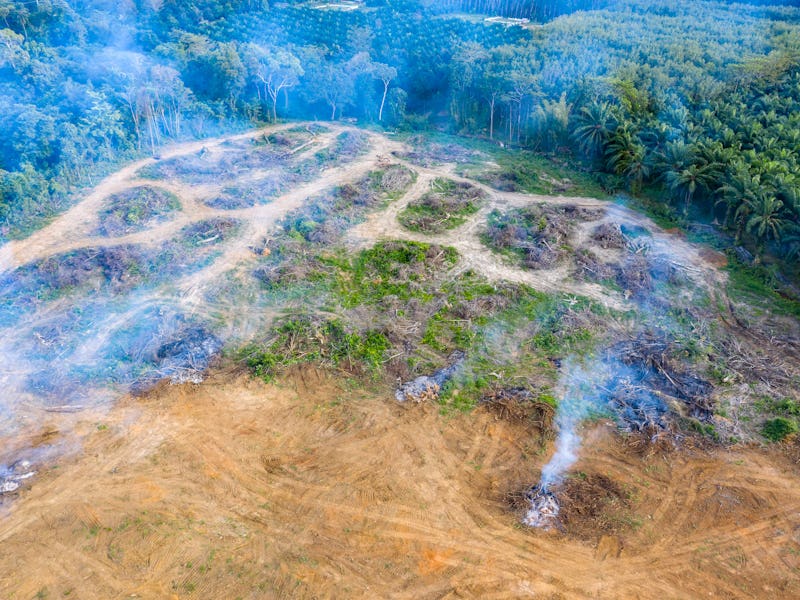Inverse Daily: Something strange at the end of the rainforest
With the help of airborne lasers, researchers have discovered exactly what's at stake.

The coronavirus pandemic has an unfortunate number of parallels to a crisis that is slower-moving yet even larger in scale: climate change.
Some have pointed out that this can be an opportunity to address both public health emergencies at once. A group of environmental justice and labor advocates have proposed a “Green Stimulus,” a set of policy solutions that could address these twin crises. From green infrastructure to renewable energy, the policies represent how a Green New Deal could take shape sooner rather than later.
In other news, I’m excited to announce the winners of last month’s rewards: congrats to Kate P., Glenn B., and Kelly N. For a look at what you can win this month, go here.
Lastly, if you’re looking for an insightful podcast into the beguiling world of smells, be sure to check out Twenty Thousand Hertz’s special “smellcast” out today!
This is an adapted version of the Inverse Daily newsletter for April 1, 2020. Subscribe for free and earn rewards for reading every day in your inbox.
Coronavirus links from Inverse staffers
- A reporter goes deep on how wealthy Americans are fleeing to their second homes in rural towns, and bringing the virus with them. (BuzzFeed News)
- How to grocery shop safely during coronavirus without being a jerk (Mic)
- “Hey, how’s Billy doing?”: An Ohio social worker on the toll coronavirus takes on disabled job seekers (The Outline)
- Learning to swim taught me more than I bargained for (New York Times Magazine)
- A pandemic expert tells us why she was so wrong about coronavirus (Vice)
Social media companies take steps to lock down on misinformation
Social media companies have historically been bad at fighting the spread of disinformation, as we saw during the 2016 election and in the years since.
During this coronavirus outbreak, social media companies are cracking down on disinformation more than ever, and they're even taking down misleading posts from influential political figures. That said, there's still quite a bit more these companies could be doing.
Here’s the story on what social media companies are doing so far to separate fact from fiction.
In other news on how tech companies are responding to the coronavirus:
Tesla details plan to build one of the biggest batteries in the world
Tesla has big plans to store more clean energy than ever before. The company has put forward a bid to build 244 Megapack lithium-ion batteries in Hawaii in an installation that could store 810 megawatt-hours of energy.
It by far outranks the 129 megawatt-hour battery in South Australia, completed in November 2017, that measured as the world’s largest lithium-ion battery at the time. But the Hawaii project may not be the world’s biggest, as the Florida Power & Light Company plans to install 900 megawatt-hours by late 2021.
Here’s the story on this mega battery.
In other big battery news:
Is diarrhea a Covid-19 symptom? Coronavirus' reach may extend beyond the lungs
Emerging data suggests it may be time to rethink Covid-19 as a strictly respiratory illness.
According to two recent studies conducted on over 400 infected patients in Wuhan, China, people with Covid-19 can show digestive symptoms like nausea, lack of appetite, and, most often, diarrhea without respiratory symptoms or a fever. The research suggests coronavirus’ reach may extend beyond the lungs, jeopardizing the entire GI tract.
“This is, to me, becoming almost as much a GI condition as a pulmonary condition,” Brennan Spiegel, director of Cedars-Sinai Health Services Research and editor-in-chief of the *The American Journal of Gastroenterology*, tells *Inverse*.
Here’s the story on this important insight into Covid-19’s symptoms.
In other coronavirus news:
Laser scans have revealed something insidious at the edge of the rainforest
Borneo, the world's third-largest island, is full of life. Orangutans swing from branches, pygmy elephants roam the land, and exploding ants creep along the treetops. But the massive island is also home to thriving industries like logging and palm oil production. Both require leveling forests, leaving Borneo's lush tree cover fragmented.
With the help of airborne lasers, researchers have discovered what that means in the long term for tropical trees and the vital ecological roles they play. Trees at the edges of forest fragments store 22 percent less carbon than trees inside forests, and the effect extends more than 100 meters into the forest, a new study shows.
Here’s the story on what’s at stake for the vital trees on the forest’s edge.
More below on rainforests under threat:
An organization is linking hospitals to crucial PPE
Medical professionals face a major hurdle during their battle against Covid-19: a crippling shortage of personal protective equipment, or PPE. These individuals are in close, repeated contact with the disease. Without PPE — items like N95 masks and surgical gowns — doctors and nurses are dangerously exposed.
Governments at all levels have struggled to provide a solution, so organizations have emerged and stepped up to help. One of those is Find the Masks, a site that helps people donate PPE at 2,285 donation sites across the United States, Guam, and Puerto Rico. The site shows you the closest donation site to you, what they need most, and provides specific instructions on how to donate.
Inverse spoke with the sites’ founder, Rachel Popkin, a senior product manager at Google. They are working with a collaborative team of tech workers, data specialists, and scientists to bring PPE to the people who need it most — and they have advice on how you can help out, too.
In other coronavirus news:
This is an adapted version of the Inverse Daily newsletter for April 1, 2020. Subscribe for free and earn rewards for reading every day in your inbox.